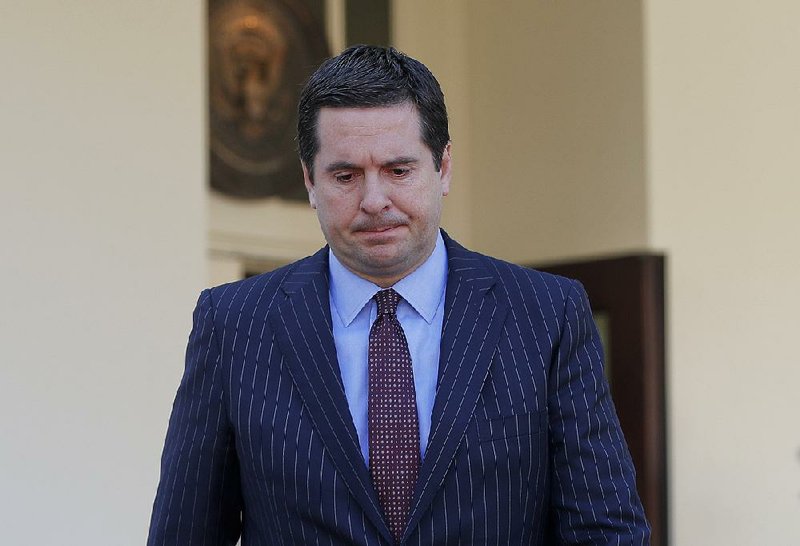WASHINGTON -- House Intelligence Committee Chairman Devin Nunes went to the White House on Wednesday to personally brief President Donald Trump about intelligence he says he has seen regarding surveillance of foreign nationals during the presidential transition.
The surveillance could have inadvertently picked up the president or members of his transition team, the chairman said.
"What I've read seems to me to be some level of surveillance activity, perhaps legal. I don't know that it's right," Nunes told reporters outside the White House. "I don't know that the American people would be comfortable with what I've read.
"The president needs to know these intelligence reports are out there," Nunes, R-Calif., said. "I think the president is concerned, and he should be."
[PRESIDENT TRUMP: Timeline, appointments, executive orders + guide to actions in first 100 days]
Trump was asked whether he felt vindicated after his meeting with Nunes in his claims that he was wiretapped during the campaign at his Trump Tower headquarters by President Barack Obama. That claim has been roundly rejected by members of the intelligence community, including FBI Director James Comey and Nunes himself, who again dismissed the wiretapping allegation Wednesday outside the White House.
"I somewhat do. I must tell you I somewhat do," Trump said when asked the question by reporters. "I very much appreciated the fact that they found what they found."
Before heading to the White House, Nunes said he briefed House Speaker Paul Ryan, R-Wis., on what he learned, and he also spoke with reporters. He said that U.S. intelligence agencies may have picked up communications involving Trump as part of court-approved surveillance of foreign intelligence targets in the period between Trump's election and his inauguration.
Nunes did not, however, brief his ranking member, Rep. Adam Schiff, D-Calif., about the contents of what Schiff said were intercepts.
Schiff said he now has a "profound doubt" about whether the Intelligence Committee can conduct a credible investigation. He contended that Nunes' actions in informing the White House before speaking to colleagues are proof that an independent commission should be formed to investigate Russia's alleged interference in the 2016 election and possible ties between Trump associates and Russian officials.
"You don't take information that the committee hasn't seen and present it orally to the press and the White House before the commitee has even had a chance to vet whether it's significant," Schiff stated. "It casts quite a profound cloud over our ability to do our work."
Schiff said he hoped the latest developments were not part of an effort by the White House to divert attention from the fact that Comey denied that the previous administration had wiretapped Trump's phones.
"I have to hope that this is not part of a broader campaign by the White House to attempt to deflect from the director's testimony earlier this week," he said.
Nunes told reporters that Trump was one of various members of the Trump team whose communications probably were intercepted through "incidental collection," or surveillance of the communications of foreign nationals who may be in contact with or talking about U.S. citizens.
The chairman would not answer the question of whether anyone associated with the White House was the source of the new information.
"From what I know right now, it looks like incidental collection," Nunes said. "We don't know exactly how that was picked up, but we're trying to get to the bottom of it."
He added that "it's possible" that Trump's personal communications were captured that way by the U.S. intelligence community.
U.S. intelligence agencies targeting foreign nationals regularly pick up communications to, from or about U.S. citizens, permanent U.S. residents, and U.S. corporations and organizations, a category referred to as incidental collection.
When they hear something or read something of interest in a call, an email or a fax, intelligence analysts will write up a report based on the information.
In those reports, the names of U.S. citizens are "minimized" to remove their identities and protect their privacy. But senior U.S. officials can ask the National Security Agency and other intelligence agencies to provide them with the names if they believe the information would allow them to better understand the intelligence.
Nunes said the situation will be clarified after he receives a full list of those who were "unmasked" during the surveillance. He said he expects to receive such information by Friday from the National Security Agency, the FBI and the CIA.
A Section on 03/23/2017

